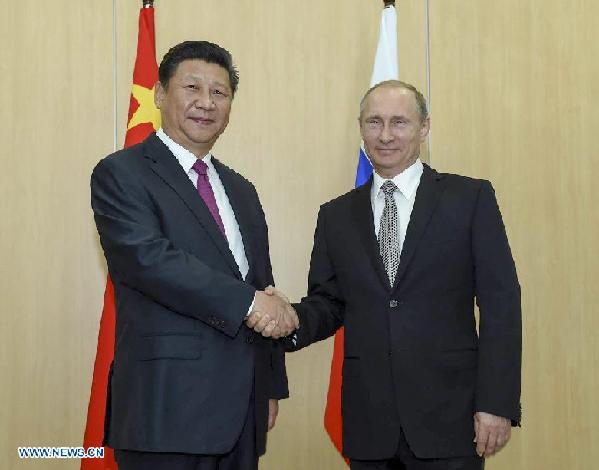China and Eurasia: an element of a new world order?
- By Tim Collard
 0 Comment(s)
0 Comment(s) Print
Print E-mail China.org.cn, July 17, 2015
E-mail China.org.cn, July 17, 2015
|
|
|
Chinese President Xi Jinping (L) shakes hands with his Russian counterpart Vladimir Putin in Ufa, Russia, July 8, 2015. [Xinhua/Li Xueren] |
This month's summits of the BRICS and SCO groups put China's relationship with Russia and the rest of the Eurasian landmass firmly in the spotlight. For China, this relationship is but one element in the global network of multi-polar diplomacy that President Xi Jinping has been assiduously building up since his inauguration in 2012, and in no way diminishes the importance of the other elements of this network, which is intended to underpin China's new significance as a great economic and political power.
From the Russian perspective, however, things look quite different. Since the break-up of the Soviet Union, almost 25 years ago now, Russia has focused largely on restoring its position of dominance in her immediate neighborhood. Though strategically still a major power, Russia has become painfully aware that its reach has grown shorter and that it holds relatively few economic cards in its hand; hence its concentration on organizations like the BRICS and SCO, in which it has just enjoyed an excellent opportunity to showcase its abiding regional significance. Therefore, Russia has emphasized making the most of its still flourishing relationship with China.
In recent years Russian diplomacy has developed a strong focus on building a Eurasian regional bloc, based loosely on the states of the former Soviet Union. Most recently this has taken the form of a Eurasian Economic Union (EEU) with Russia, Belarus, Kazakhstan and Armenia as members. Obviously this is a part of Russia's "western" diplomatic policy, aimed at creating counterweights to NATO and the EU, with whom it has recently found itself increasingly at loggerheads. It is no part of China's policy to intervene in any way in Russia's various disputes with the West, which is why China has scrupulously avoided taking sides on the Ukraine issue.






